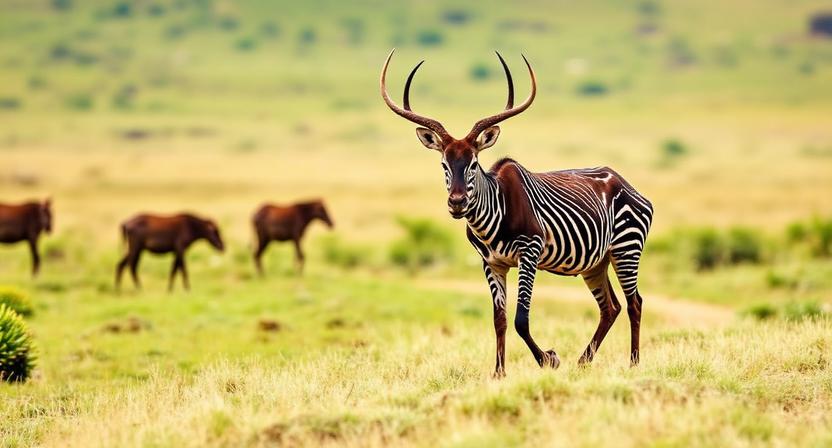Cameroon Launches a Legal Hub to Centralize their Wildlife Laws, Promoting Sustainable Tourism and Biodiversity Conservation Growth

Published on
November 12, 2025

The Legal Hub, an innovative digital platform that puts together all the wildlife laws and management protocols, has been launched by MINFOF to ensure greater transparency and efficiency in the management of the sector. The creation of the site comes in the context of the EU-backed Sustainable Wildlife Management Programme, through technical support from the UN Food and Agriculture Organization, to reduce poaching and promote sustainable tourism development in Cameroon.
By consolidating analyses from a legal perspective along with policy guidelines, the Legal Hub has been designed to ensure that tourism businesses, local communities, and other stakeholders align with the international standards on biodiversity and go further in their contributions toward eco-tourism and wild-life conservation. The hub plays a key role as Cameroon works towards strengthening its position as a tourism destination with key involvement in eco-friendly tourism practices that preserve its rich biodiversity.
Promoting Eco-Tourism: Connecting Conservation and Tourism Growth
Eco-tourism has become an important pillar of Cameroon’s tourism industry. With the Legal Hub providing easy access to legal frameworks for wildlife protection, the platform directly supports the growth of eco-tourism in the country. The Sustainable Wildlife Management Programme promotes tourism products that showcase Cameroon’s natural beauty, including national parks, wildlife reserves, and forest ecosystems.
The Legal Hub facilitates the development of tourism experiences that highlight local conservation efforts and environmentally sustainable travel. By ensuring that wildlife tourism aligns with legal standards and best practices, Cameroon is positioning itself as a leading eco-tourism destination in Africa. Tourists seeking authentic wildlife experiences in Africa will increasingly be drawn to Cameroon’s safeguarded natural habitats and wildlife-friendly travel experiences.
Attracting Investment in Eco-Tourism and Biodiversity Research
In addition to supporting tourism businesses, the Legal Hub aims to attract investment in eco-tourism and biodiversity research. As global tourism trends increasingly favor eco-friendly and sustainable experiences, Cameroon is positioning itself to draw international investors who are interested in developing conservation-linked tourism projects. By providing clear legal guidelines and policy support, the Legal Hub will help attract investment in nature-based tourism initiatives, which will benefit local communities and conservation efforts.
This platform also supports biodiversity research by offering resources for scientists and research organizations working on wildlife conservation in Cameroon. With eco-tourism and biodiversity research gaining momentum globally, the Legal Hub will help make Cameroon an attractive destination for those seeking to engage in conservation tourism and scientific exploration.
Curbing Poaching: A Critical Aspect for Sustainable Tourism
One of the key issues the Legal Hub addresses is the rising threat of poaching, which threatens wildlife populations and impacts the eco-tourism industry. By offering real-time access to wildlife laws and anti-poaching regulations, the platform helps reduce the number of illegal activities that damage the island’s biodiversity. This ensures that tourism operators and local communities can focus on sustainable tourism without compromising the integrity of natural environments.
The platform’s role in curbing poaching is especially critical for the continued development of safari tourism and wildlife viewing in Cameroon’s national parks, which are key attractions for tourists and wildlife enthusiasts. By protecting endangered species and promoting ethical wildlife experiences, the Legal Hub strengthens the foundation of eco-tourism and ensures long-term sustainability for the tourism industry.
Raising Awareness and Promoting Responsible Tourism Practices
A major feature of the Legal Hub is its role in raising legal literacy among tourism stakeholders, particularly tour operators, guides, and government bodies. By providing accessible information on wildlife management and tourism laws, the platform helps ensure that eco-tourism operators comply with environmental regulations and ethical tourism standards.
The Hub’s focus on responsible tourism practices will promote greater awareness of wildlife conservation and encourage travelers to make more sustainable choices during their visit. With the rise of eco-tourism, there is a growing demand for authentic and environmentally conscious travel experiences, and Cameroon is increasingly becoming a destination that caters to this market segment.
Collaboration with Stakeholders: Strengthening Cameroon’s Tourism Ecosystem
The Legal Hub is part of Cameroon’s broader effort to build stronger partnerships between government bodies, local communities, tourism operators, and international conservation organizations. Working together, these stakeholders can promote responsible tourism and create an ecosystem that supports both wildlife preservation and tourism growth.
The collaborative approach encourages the development of new tourism products that are both economically viable and environmentally sustainable. The tourism industry and conservation community in Cameroon will benefit from shared knowledge and resources that contribute to sustainable eco-tourism development.
A Sustainable Future for Cameroon’s Eco-Tourism Sector
The launch of the Legal Hub is one of the most important steps toward developing a sustainable tourism model in Cameroon. This harmonizes the protection of wildlife with tourism growth to ensure a better relationship between tourists and local wildlife. In the process, the Legal Hub provides support for the development of eco-tourism in Cameroon through legal education, community engagement, and collaboration; these qualities have helped position Cameroon among the leading eco-tourism destinations in Africa.
The tourism sector was sure to thrive in Cameroon by attracting investment, promoting responsible travel, and protecting natural resources in such a way that its wildlife and natural landscapes would remain viable for future generations. This is far beyond increasing tourism-it’s about an enduring impact on economic prosperity and environmental stewardship for this country.
link






